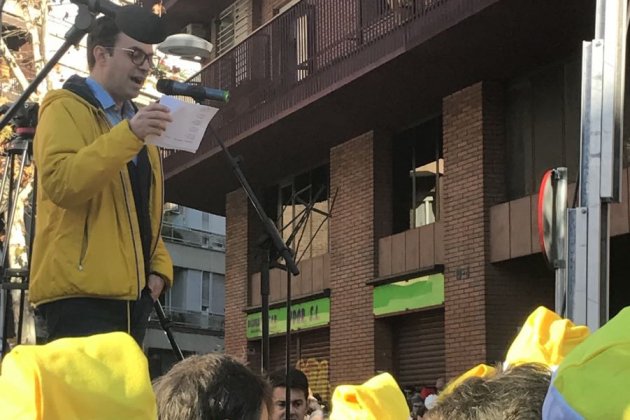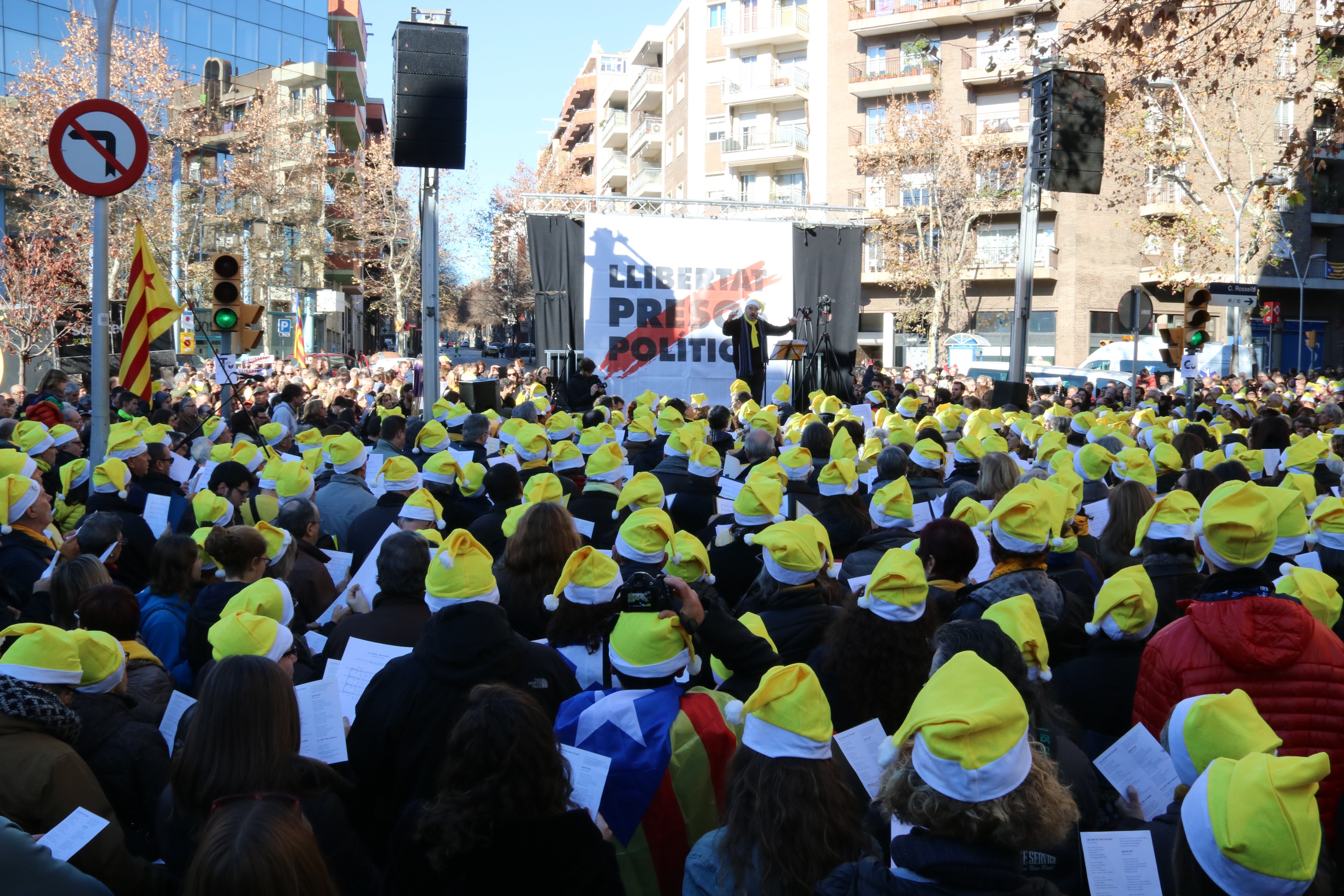Hundreds of people gathered on Christmas Eve morning outside Barcelona's now-disused Model prison to sing Christmas carols dedicated to the four Catalan leaders jailed in Madrid: acting vice president Oriol Junqueras, acting interior minister, Joaquim Forn, ex-president of the Catalan National Assembly (ANC), Jordi Sànchez and the president of Òmnium Cultural, Jordi Cuixart.
The mass carol session was organised by the groups Call for Democracy and Musicians for Freedom, which on December 3rd had also congregated more than 10,000 musicians and singers in Barcelona's Plaça Espanya to call for the release of the prisoners. Today's initiative was also replicated in many towns across Catalonia in front of local town halls; in Girona, more than 500 people took part, and other carol sessions took place in Sant Cugat, Taradell and Berga.
Introducing the carol singing session in Barcelona, the vice president of Òmnium, Marcel Mauri, complained about the situation of the prisoners and called on those present to sing “to show solidarity with their families, who will not be able to have their loved ones at home this year.” Agustí Alcoberro, vice president of the ANC, continued: “We want to be alongside the prisoners' families, because now that the independence movement has won the elections there is no sense in continuing to deprive them of their freedom”.
For his part, Mauri added that now that the elections are over there is a lot of work to do, because “the people have spoken very clearly once again", and he also demanded that the Spanish government suspend article 155. “Solutions can only be reached through dialogue," he said. "It is time that the Spanish state came back to its senses”.
Once the leaders' speeches were over, the hundreds of singers put on Santa hats coloured yellow - the colour of solidarity with the prisoners - and prepared to launch into song. First tune of the concert was the modern Catalan carol Quan somrius, composed by Josep Thió, with lyrics adapted to call for freedom for the prisoners.
Comencem cantant la nadala “Quan Somrius”, una peça de Josep Thió que hem adaptat pel moment que estem vivint.
— Cultural Òmnium (@omnium) 24 of December 2017
Moltes gràcies a tots i a totes que heu fet possible aquest crit a la llibertat.#NadalGroc pic.twitter.com/O19VQhidfz
This was followed by a block of more traditional Christmas carols: firstly, the Catalan song El noi de la mare, followed by the universal Silent night, and also including journalist Oriol de Balanzó's reading of El meu poble i jo written by 19th century Catalan poet Salvador Espriu.

Una marea groga, que ha vingut davant la presó Model de Barcelona per fer un reclam a la llibertat, canta ara la versió de Franz Grüber de "Santa Nit"#NadalGroc #LlibertatPresosPolítics pic.twitter.com/NRIYupwujm
— Cultural Òmnium (@omnium) 24 of December 2017
Continuem amb la interpretació d'una de les peces més tradicionals catalanes: El noi de la mare#NadalGroc #LlibertatPresosPolítics pic.twitter.com/06oAz3UX2w
— Cultural Òmnium (@omnium) 24 of December 2017
The carol singers scarcely rested their voices between songs, instead allowing the abandoned prison to echo with the sound of chants: “Freedom for political prisoners”, “We are a Republic” and “Independence”. This last one served as a prelude to an interpretation of El cant dels ocells, another Catalan carol, best known in the version recorded by cellist Pau Casals.
Crits de "Llibertat Presos Polítics" abans de la Cantada de Nadales davant de la presó Model de Barcelona#NadalGroc #LlibertatPresosPolítics pic.twitter.com/pK612vHe9M
— Cultural Òmnium (@omnium) 24 of December 2017
To close the event, Lluís Llach's anti-Franco resistance song L'estaca was sung, but also in a slightly nuanced version: instead of the chorus line which says “if we pull, pull, pull, we'll be able to set ourselves free”, the crowd sang ““if we pull, pull, pull, we'll be able to set them free”, in allusion to the political prisoners. L'estaca was intended to be the last item on the programme, but those present did not want to leave without interpreting the Catalan national anthem Els segadors.
Tot el públic alça la veu per cantar "L'Estaca", un tribut a la llibertat, la democràcia, i la solidaritat#NadalGroc #LlibertatPresosPolítics pic.twitter.com/KcXI2LwKiB — Cultural Òmnium (@omnium) 24 of December 2017

